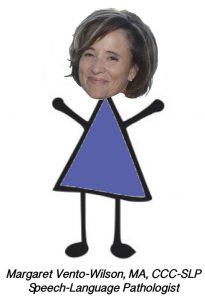 Education with an emphasis in Disabilities Studies (Chapman University)
Education with an emphasis in Disabilities Studies (Chapman University)
margaret@schoolsavers.com
Background: I spent the last week of my best friend’s life with her, and in those last couple of days, I constructed a very simple low-tech AAC system so she could communicate her wants, needs, and emotional state. I was deeply affected by that experience and thus wrote my master’s thesis on AAC in the acute care setting. Further, I work with elementary school students who use AAC on a daily basis. AAC has continued to capture my interest to such a level that it is the topic of my dissertation.
Current Interests: I am very intrigued at the language development process for children who acquire an AAC system concomitant to acquiring their language. I contend that these children are true “native speakers” of AAC. I am also very interested in how SLPs approach language development for these children and the differentiation in an intervention approach that focuses on the development of functional communication versus language development.
Sample Presentation/Publication: My publications on AAC number only two: my thesis (“The Role of the speech-language pathologist (SLP) and augmentative and alternative communication (AAC) for acute care patients with severe communication impairments”) and a chapter on AAC in an SLPA resource manual (“Augmentative and Alternative Communication: Speech-Language Pathology Assistants: A Resource Manual.”). My other publications reflect one of my other interests, congenital aglossia. I recently presented at CSHA on ““Interdisciplinary Collaboration in the Special Education Classroom with SLPs: The Language, Literacy, and AAC Clinic.” I developed this clinic with two colleagues. We received a California state level award, “California School Boards Association Golden Bell Award,” for the program and it continues to demonstrate true gains and has contributed to an overall cultural shift at my school site. I have multiple students on my caseload who use AAC and I have seen first hand that there are children who can develop true language with appropriate syntax and semantics with AAC systems. As an SLP at an elementary school, it is the “ah ha” moments that give me the momentum to persist past what feels like incremental steps. Last week, when a child used his device to tell a lie about his yellow cat (that he doesn’t have!), I felt confident that what I do daily is the right thing.
Dissertation Chair: Dr Dawn Hunter
Presentation Topic: Latent Influences on SLPs’ Intervention Practices: A Grounded Theory Approach
Comments are closed.